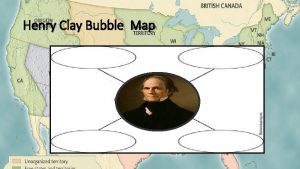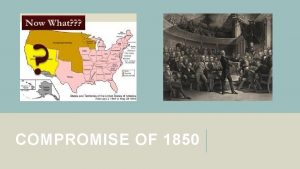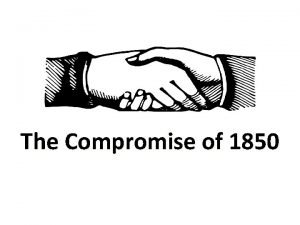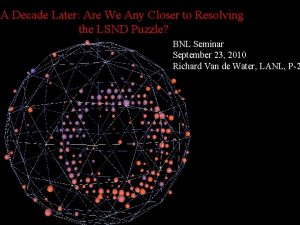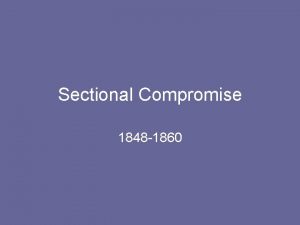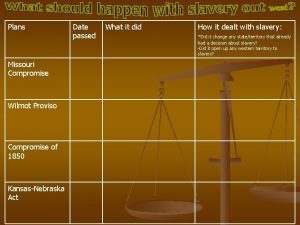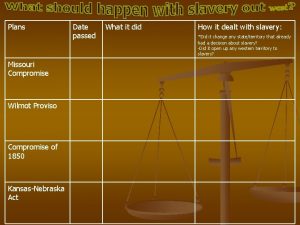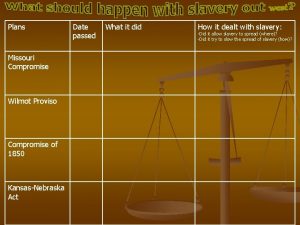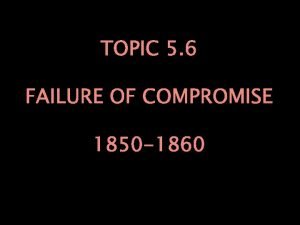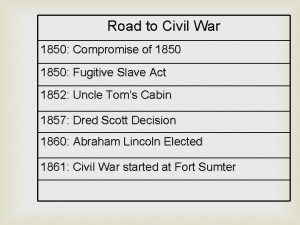Decade of Crisis 1850 1860 Compromise of 1850















- Slides: 15

Decade of Crisis 1850 -1860


Compromise of 1850 The Compromise of 1850 was a series of laws that attempted to resolve the territorial and slavery controversies arising from the Mexican-American War One part admitted California as a free state The Slave TRADE was abolished in Washington D. C. The Fugitive Slave Law was passed which required Americans to help capture runaway slaves, even if they were in free territory Allowed popular sovereignty over the New Mexico Territory Popular Sovereignty is the idea that a state can vote whether to enter the Union as a free state or a slave state

Compromise of 1850

Opposition to the Compromise Many southerners opposed the Compromise because it disturbed the balance of power in the senate They also thought it unconstitutional to abolish the slave trade in the D. C. However the south supported a fugitive slave law, but that law was opposed in the north

Uncle Tom’s Cabin, Harriet Beecher Stowe Uncle Tom’s Cabin is a book about the sufferings of Slaves The south will ban it, the north will become more abolitionist

Kansas-Nebraska Act Happens because of the Transcontinental Railroad The Kansas-Nebraska Act of 1854 created the territories of Kansas and Nebraska and allowed the settlers to decide whether or not to have slavery. This is known as Popular Sovereignty This Nullified the Missouri Compromise The result was bleeding Kansas where hundreds died in a mini civil war trying to make Kansas either Slave or Free

Kansas-Nebraska Act

Changes from Missouri Compromise to Kansas-Nebraska Act 3 1 2

Caning of Sumner Senator Preston Brooks will beat Sen. Charles Sumner in the Senate over a debate about slavery

Birth of the Republican Party 1. Coalition of Whigs, Free Soilers, and Know Nothings, who opposed slavery Opposed expansion of slavery to new territories b. Did not adopt an anti-slavery campaign c. Free Soilers oppose the expansion of slavery d. Know Nothings are anti immigration, also known as Nativists a.

Dred Scott v. Sanford Dred Scott was a slave from Missouri, his master moved him to free territory He sued to be free since he was in free territory The supreme court said no “A black man does not have any rights a white man must respect” This nullifies all compromises and says that slavery can go anywhere

James Buchanan

John Brown’s Raid -Hoped to seize weapons at federal arsenal in Virginia and give them to slaves. -It failed and John Brown was hanged by Virginia John Brown

Results of John Brown’s Raid • The south believes northern abolitionists are trying to advocate slave rebellion • The south begins to form militias to help put down any rebellion • This is the beginning of the Confederate Army
 Compromise of 1850
Compromise of 1850 Explain the compromise of 1850
Explain the compromise of 1850 Compromise of 1850
Compromise of 1850 Who created the compromise of 1850? *
Who created the compromise of 1850? * Compromise of 1850
Compromise of 1850 Myasthenic vs cholinergic crisis
Myasthenic vs cholinergic crisis Whom do lennie and george agree to let live on their farm
Whom do lennie and george agree to let live on their farm The sixties a decade of protest and change
The sixties a decade of protest and change 1 decade later
1 decade later Dics innovatives
Dics innovatives 20s decade fashion
20s decade fashion What decade did radio drama achieve widespread popularity?
What decade did radio drama achieve widespread popularity? Decade counters
Decade counters Record peach harvest—price lowest in a decade
Record peach harvest—price lowest in a decade Global plan decade of action for road safety
Global plan decade of action for road safety Serial killers by decade
Serial killers by decade

